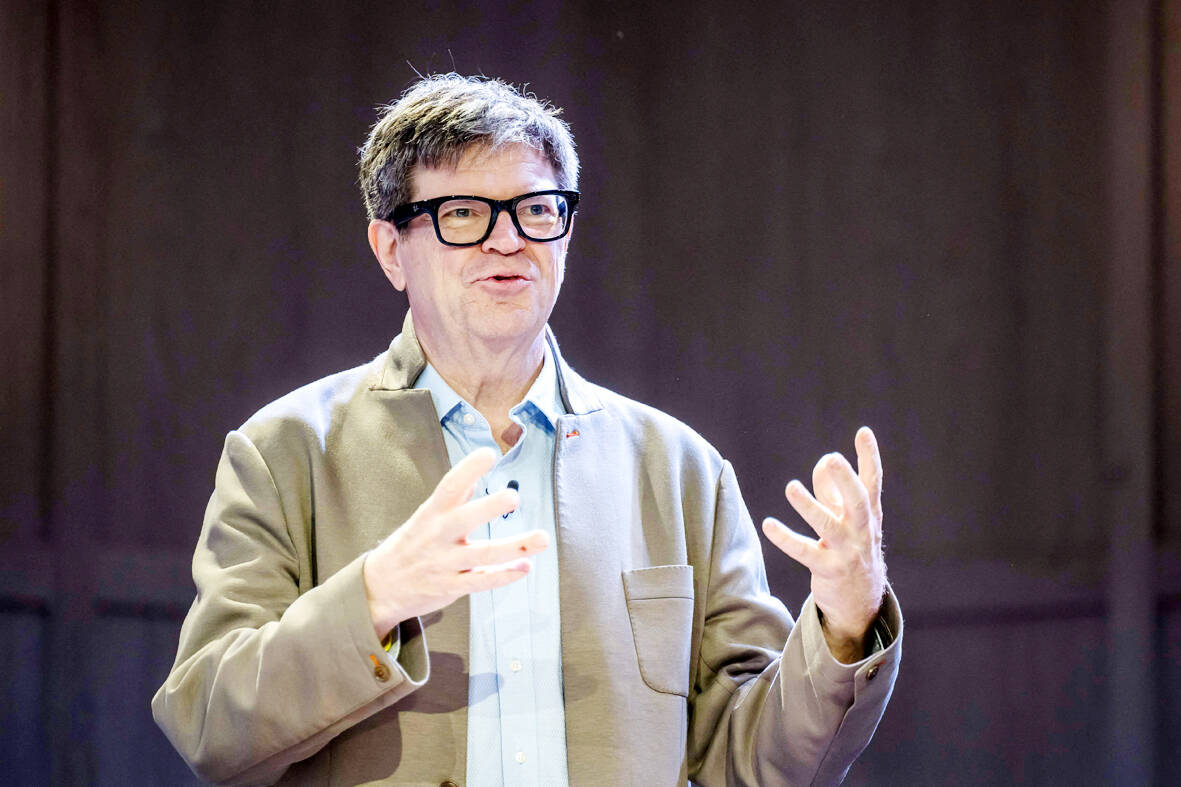One of the “godfathers” of modern artificial intelligence has predicted a further revolution in the technology by the end of the decade, and says current systems are too limited to create domestic robots and fully automated cars.
Yann LeCun, the chief AI scientist at Mark Zuckerberg’s Meta, said new breakthroughs are needed in order for the systems to understand and interact with the physical world.
LeCun spoke as one of seven engineers who were awarded the £500,000 (US$625,000) Queen Elizabeth prize for engineering on Tuesday for their contributions to machine learning, a cornerstone of AI.

Photo: AFP
Recent breakthroughs in the sector, led by the launch of OpenAI’s ChatGPT chatbot, have heightened expectations — and fears — of systems gaining human levels of intelligence.
However, LeCun said there was some way to go before AIs matched humans or animals, with the current cutting-edge technology excelling at “manipulating language” but not at understanding the physical world.
“There are still a lot of scientific and technological challenges ahead, and it’s very likely that there’s going to be yet another AI revolution over the next three to five years because of the limitation of current systems,” he said. “If we want eventually to build things like domestic robots and completely autonomous cars, we need systems to understand the real world.”
LeCun is working on systems that attempt to “understand” physical reality by forming a model that can predict how the world behaves. On current progress in AI, he said: “We’re not talking about matching the level of humans yet. If we get a system that is as smart as a cat or a rat, that would be a victory.”
However, LeCun’s fellow QEPrize winner and AI “godfather,” Yoshua Bengio, warned more progress was needed on the technology’s safety and called on next week’s global AI summit in Paris to grasp the issue.
“I’d like to see the leaders of this world to better understand the magnitude of what we are doing, both in terms of the power we’re creating, which could be for good or be dangerous, and the risks that come with that power,” he said.
In 2018, Bengio and LeCun shared the Turing award — seen as the equivalent of a Nobel prize for computing — with Geoffrey Hinton, who was also announced as a QEPrize winner on Tuesday. The award comes after AI pioneers won two Nobel prizes last year. They included Hinton — who shared the Nobel for physics with another recipient of this year’s QEPrize, the US physicist John Hopfield — and the Google DeepMind scientists among the winners of the chemistry prize.
Machine learning is a core process in developing AIs. Instead of being instructed directly, computers “learn” by analyzing data and then making informed decisions or predictions — such as what will be the next in a sequence of words.
The other winners of the 2025 QEPrize are: Li Feifei (李飛飛), the Chinese-American computer scientist who created ImageNet, a crucial dataset for training AIs to recognize objects; Jensen Huang (黃仁勳), the chief executive of Nvidia, the lead maker of chips used in operating and training AI systems; and Bill Dally, the chief scientist at Nvidia.
Patrick Vallance, the chair of the QEPrize foundation and the UK science minister, said the impact of machine learning was being felt across “industries, economies, and the planet,” The annual prize recognizes engineers whose innovations have a “significant impact on billions of lives around the world,” he said.

Towering high above Taiwan’s capital city at 508 meters, Taipei 101 dominates the skyline. The earthquake-proof skyscraper of steel and glass has captured the imagination of professional rock climber Alex Honnold for more than a decade. Tomorrow morning, he will climb it in his signature free solo style — without ropes or protective equipment. And Netflix will broadcast it — live. The event’s announcement has drawn both excitement and trepidation, as well as some concerns over the ethical implications of attempting such a high-risk endeavor on live broadcast. Many have questioned Honnold’s desire to continues his free-solo climbs now that he’s a

Lines between cop and criminal get murky in Joe Carnahan’s The Rip, a crime thriller set across one foggy Miami night, starring Matt Damon and Ben Affleck. Damon and Affleck, of course, are so closely associated with Boston — most recently they produced the 2024 heist movie The Instigators there — that a detour to South Florida puts them, a little awkwardly, in an entirely different movie landscape. This is Miami Vice territory or Elmore Leonard Land, not Southie or The Town. In The Rip, they play Miami narcotics officers who come upon a cartel stash house that Lt. Dane Dumars (Damon)

Francis William White, an Englishman who late in the 1860s served as Commissioner of the Imperial Customs Service in Tainan, published the tale of a jaunt he took one winter in 1868: A visit to the interior of south Formosa (1870). White’s journey took him into the mountains, where he mused on the difficult terrain and the ease with which his little group could be ambushed in the crags and dense vegetation. At one point he stays at the house of a local near a stream on the border of indigenous territory: “Their matchlocks, which were kept in excellent order,

Today Taiwanese accept as legitimate government control of many aspects of land use. That legitimacy hides in plain sight the way the system of authoritarian land grabs that favored big firms in the developmentalist era has given way to a government land grab system that favors big developers in the modern democratic era. Articles 142 and 143 of the Republic of China (ROC) Constitution form the basis of that control. They incorporate the thinking of Sun Yat-sen (孫逸仙) in considering the problems of land in China. Article 143 states: “All land within the territory of the Republic of China shall